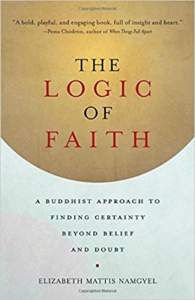Award Winning Author
Face Reading with Before & After Photos
Finding Certainty Beyond Belief and Doubt
Despite today’s assault of alarming news, there is reciprocity at the heart of the universe and this good news provides us with direction and the ability to rediscover our mutual belonging. My teacher, Elizabeth Mattis Namgyel, has just published a lively and engaging book, The Logic of Faith, that I enthusiastically recommend to everyone who is looking to make sense of our world as well as our individual lives. Here’s a brief excerpt.
The ‘F’ word
This entire book hinges on the word faith. You may assume that you know what that means. You may think that it has a single, clear definition. But words are not definitive structures: one word can have limitless – even opposing – meanings. Language morphs over time and words take on different meanings depending on their contexts. You’ll likely find as many definitions of faith as there are people to define it. Try asking around.
Just to give you an idea of some of the possible usages for the word faith, look at a standard English dictionary, which will most likely include in the definition such terms as: dogma, religion, fundamentalism, doctrine or indoctrination, confidence, trust, conviction, and spiritual insight, to name a few. People make strong statements about faith, such as: “Faith without doubt leads to moral arrogance” or “If you don’t have unwavering faith in God, you will go to hell.” Some people feel that those who claim to have faith are deceiving themselves. These people equate faith with the disempowerment that results from blindly handing over agency to an authority figure. For others, faith describes the highest expression of human consciousness that transports us beyond the petty concerns of mundane life. Upon reflection you may notice that you use the term faith in various ways. But notice too that these varied usages have one thing in common; they reflect the desire to find ease in a world you can’t secure.
Do you think it would even be possible to live in the world without faith? Because we rely on life around us it seems to me we have no choice but to have faith. The late Buddhist teacher, Trinley Norbu Rinpoche, linked faith to the nature of existence, when he said: “Cows have faith in grass.” This statement may seem simplistic at first glance, but it has deep implications. You cannot remove faith from the equation of your earthbound relative condition. That you depend on the world in which you live keeps you living in faith and there is no way around it.
Given the multiplicity of definitions one finds around faith, and given how crucial it is to our very existence, faith is worthy of deep consideration.
The End of Faith?
At some point, after an extended period of exploring faith through personal practice and study, I decided to bring my investigation out into the world to see what others thought. I quickly learned that when I described my teaching topic using the word faith, no one was interested. In fact, once, when doing an online program on faith, someone wrote in on the chat, “This is just the mentality my grandmother had!” It was as though, by simply uttering the “F” word, I had insulted his intelligence. For him faith was something that could only be outdated and backward. I have, by the way, noticed that the “F” word does not generally go over well at Buddhist conferences either.
Subsequently, I started to call my inquiry “The F-Word” – and after that everyone wanted to talk. People are drawn to things that have a rebellious flare. And so I did what I had to do in order to draw attention to a topic that I feel is in desperate need of examination. As spiritual practitioners, scholars, and human beings looking for a sense of ease, it behooves us to reflect on the things that incite discomfort in us or that we don’t understand, rather than simply buying into or rejecting them.
Many contemporary thinkers want to do away with the word faith altogether and replace it with the term spirituality. In his book, The End of Faith, Sam Harris links faith to terrorism, and reasonably so. People do unconscionable things in the name of faith. And yet, I wonder: can we afford to do away with the word faith altogether? Personally, I think that’s way too easy. I’m not saying the word, “spirituality,” doesn’t have its use in the English language. But if you are not careful, spirituality can quite easily allow you to bypass the human dilemma because spirituality can be anything you want it to be, whereas faith will challenge you. It’s not so comfortable. It carries with it the undeniable tension between your search for security and the limits of your ability to know. Faith keeps your spiritual quest relevant and connected to the heart of the human predicament.
My concern also is that by narrowing down the definition of faith to blind acceptance or dogma, we risk losing genuine traditions of contemplative wisdom and practice. The initial function of spirituality emerged from questioning the human condition and also from deep experiences of wonder. The word religion itself, initially meaning to “reconnect,” seems to have come from direct experiences of something larger than just a set of fixed ideas. It marked a return to something essential that we just failed to recognize in the myopia of our everyday lives. How curious, that we turn experiences of awe into dogmas and stagnant ideas. That we have come to associate faith with fundamentalism, blindness, and even terrorism gives us something important to look at.
Excerpted with permission from The Logic of Faith: A Buddhist Approach to Finding Certainty Beyond Belief and Doubt, by Elizabeth Mattis Namgyel.


